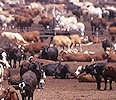
Lower humidity and higher wind speeds are helping feedlot owners cope with temperatures in the triple digits this week, and state officials said they are hopeful of avoiding additional serious death losses in the feedyards.
Heat stress resulted in more than 2,000 deaths of cattle in feedlots around July 20 according to the Kansas Department of Health and Environment.
But officials are hoping cattle will be better able to cope with the current heat wave because humidity levels have dropped with successive days of hot, dry weather.
"The sad thing is the cattle most likely to die are the ones that are closest to harvest," said Extension beef veterinarian Larry Hollis with Kansas State University. "My advice to feedlot owners is to try to move those cattle to market ahead of a heat wave if you get enough advance warning."
Hollis said feedlot operators are working around the clock trying to keep cattle cool, with some workers toiling around the clock for 72 hours without rest.
"They turn on the water and hose those cattle down, wet them to the skin with cool water and that helps," he said. "But once you start you have to keep at it until conditions change."
To help cattle producers and feedlot managers determine the risk of life-threatening conditions, the University of Nebraska developed a Temperature-Humidity Index. The index is part of a Livestock Weather Hazard Guide, posted on the Ardmore, Okla., website of the Samuel Roberts Noble Foundation.
Hollis said sufficient water is critical and can be a problem in some feedyards.
"A lot of the managers will move big, round tanks into the pens and haul extra water to supplement the automatic waterers," he said. "The cattle will crowd around those waterers and the more they crowd together, the worse the heat."
About the Author(s)
You May Also Like




